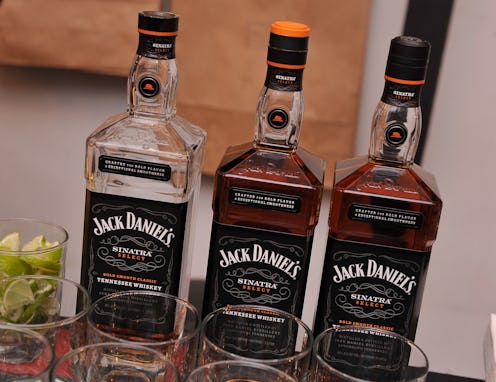News
This Tennessee Whiskey Bill Has Really Upset Jack
What's in a name? Well, Tennessee is considering changing what "Tennessee whiskey" means, and cult brand Jack Daniel's ain't happy. The state's aim is to cut down on the whiskey-making stipulations that breweries have to stick to if they want to label their liquor "Tennessee whiskey." At present, it's complicated and time-consuming to create "Tennessee whiskey," as ol' Jack Daniels can afford to do, and does — but if the legislation goes through, other whiskey brands will find it easier and cheaper to use the title.
Jack Daniels' rebuttal is that this will weaken the prestigious standards of what Tennessee whiskey truly means. However, tther whiskey distilleries believe it's a more sensible route to a sought-after, culturally popular label.
The law at present lays down the following requirements for the label of "Tennessee whiskey," which reads like a strict overview of how Jack's Old No. 7 is made:
- The whiskey must be fermented from mash of, at minimum, 51 percent corn.
- It must be filtered through maple charcoal.
- It must be bottled at a proof of 80.
- It must be aged in new, charred oak barrels, never before used for the purpose.
It's that last item that the legislature is considering changing. At present, to earn the right to slap the words "Tennessee whiskey" on your label, the barrel used for aging must be new, and as such there's no such thing as recycling them. It's a wasteful process, and one that creates extra cost — each barrel runs at about $600, according to a source cited by the AP. (A spokesperson for Jack Daniel's told Bustle that the AP source was incorrect, and that a charred oak barrel costs between $150-$175 if new.)
While those are expenses that can no doubt be easily absorbed by an industry titan like Jack Daniel's, it's not hard to imagine why a smaller craft distillery would like to refill the old one rather than throw it away. Still, a spokesperson for Jack Daniel's told Bustle: "The cost difference between old and new barrels is not enough to make a significant difference for the craft distillers."
It'd be disingenuous to see this as a simple battle between big business and the little guy — the new revisions, introduced by Republican state Rep. Bill Sanderson, were admittedly at the behest of Diageo PLC. Diageo is a British conglomerate which owns and produces George Dickel, a nearby rival to the famed Jack.
This is only fitting, after all — it was at the urging of Jack Daniel's corporate ownership that last year's law got passed in the first place. Said Rep. Sanderson:
There are a lot of ways to make high-quality whiskey, even if it's not necessarily the way Jack Daniel's does it. What gives them the right to call theirs Tennessee whiskey, and not others?
Regardless of the corporate instigations at play, however, such a change to the law would undeniably be beneficial to smaller distilleries. Jack Daniel's would still be entitled to its strident standards of quality, and could promote themselves on that strength, while a batch of old-barrel whiskey from Tennessee wouldn't lose its regional identity. As jockeying between enormous booze brands goes, seems like a fair trade, no?
